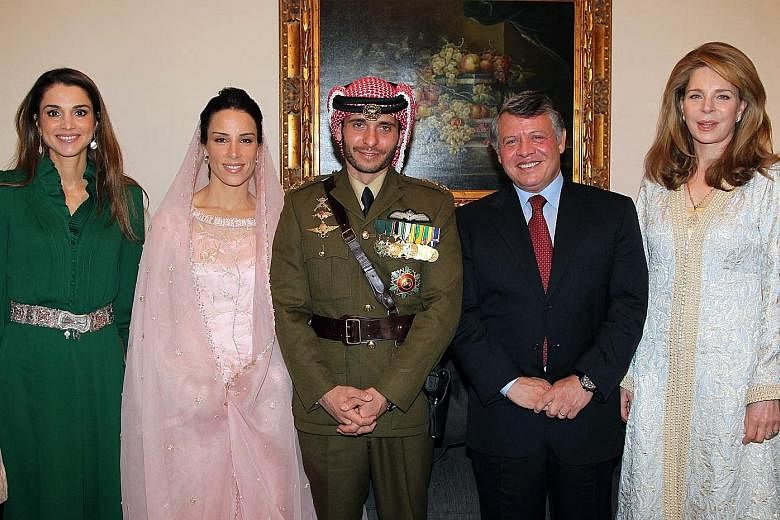AMMAN (Jordan) • When Prince Hamzah visited the relatives of Covid-19 patients who died after a hospital ran out of oxygen, he triggered a rift in Jordan's monarchy that has shaken the country's reputation as a stable country in a volatile region.
The March 14 visit to the city of Salt was, in the words of a senior establishment figure, the "straw that broke the camel's back", coming as it did hours after King Abdullah II of Jordan had visited the hospital and publicly scolded the management for the nine deaths.
Prince Hamzah made the trip to console the bereaved six days before Prince Hussein went to the city to do the same, a move that some officials said had upstaged his younger rival for the throne.
Reuters spoke to more than a dozen officials, former officials and palace insiders about the events leading to the accusations against Prince Hamzah.
They spoke on condition of anonymity in order to be able to discuss sensitive issues.
Eight sources said Prince Hamzah's visit had undermined his half-brother the King, and prompted the authorities to place him under house arrest and accuse him of involvement in activities aimed at destabilising the country.
While Prince Hamzah and the King have publicly buried the hatchet, the dramatic events of last weekend exposed fault lines within a royal family that has helped shield Jordan from the turmoil that has consumed neighbouring Syria and Iraq.
Prince Hamzah, 41, was widely expected to have succeeded King Abdullah, 59, as Jordan's next king, until the monarch made Prince Hussein his heir instead in 2004, in line with family tradition.
Some experts worry that the feud could reignite, given underlying problems in Jordan like poverty, joblessness and rising Covid-19 deaths which they said contributed to tensions spilling into the open.
"The family feud is over, yet we have to address the issues that prompted it... unemployment, Covid-19 management and poverty," Mr Jawad al Anani, who served as the last royal court chief under the late King Hussein, told Reuters.
"These are the causes (of)... the frustration that pushes people to follow their own idols."
Prince Hamzah could not be reached for comment on the causes of the palace rift and his motives for visiting the bereaved families.
The palace declined to comment when asked what had prompted the government to move against Prince Hamzah, who has not been seen in public since the feud erupted.
On Wednesday, the King said sedition had been quashed and Prince Hamzah was "under my care". The Prince pledged allegiance to the King after mediation by the royal family.
Officials said between 14 and 16 people had been arrested in connection with the alleged plot.
Prince Hamzah was warmly welcomed by families of the deceased in Salt during his visit last month.
Small protests over the hospital's oxygen shortages had broken out across Jordan, and some participants were chanting the Prince's name and calling on him to save the country.
The hospital could not be reached for comment early on Friday, a weekend day in Jordan.
The King has been pushing his 26-year-old son Prince Hussein increasingly into the spotlight.
Prince Hussein has been seen at the King's side on most public occasions and often accompanies him on foreign visits.
Prince Hamzah's activities were a concern to the King long before events came to a head last month, said some prominent politicians.
The Prince, son of the late King Hussein and Queen Noor, has nurtured close ties with Jordan's tribes, which dominate the security forces and form the bedrock of support for the kingdom's Hashemite monarchy.
This year, he stepped up his trips to rural and provincial areas to meet disgruntled tribal leaders who formed a loose opposition movement called Herak, many of whose members are army and security retirees.
On social media, he appeared sitting in Bedouin tents sipping tea and conversing with elders who were critical of the King for failing to provide them with enough jobs or financial security.
Although Prince Hamzah rarely voiced his opinion publicly, the palace saw the Prince's outreach as a bid to undermine the King and his son's growing profile as a champion of equal opportunity for the country's youth, several sources said.
It also flouted rules that require any royal to inform the palace of visits to public places, three palace officials added.
Security forces had been following Prince Hamzah's every step and informing the monarch more regularly about his activities at a time of rising public discontent over record unemployment and poverty, said three sources.
When asked about the monitoring, a security official said it was the job of intelligence agencies to protect the country's safety.
Over the last decade, anger with the authorities over worsening living standards and alleged corruption has triggered major civil unrest in Jordan, mainly in the provincial and Bedouin areas where Prince Hamzah has reached out to local leaders.
Over the last 20 years, Prince Hamzah cultivated loyalty by emulating his father's language, voice, behaviour and even attire.
Tribal sources said that the well-mannered, Western-educated Prince made a point of learning the dialects of every tribe.
As his popularity appeared to grow, the authorities felt the time had finally come to step in.
"He left us with no option," said one senior political figure.
REUTERS

